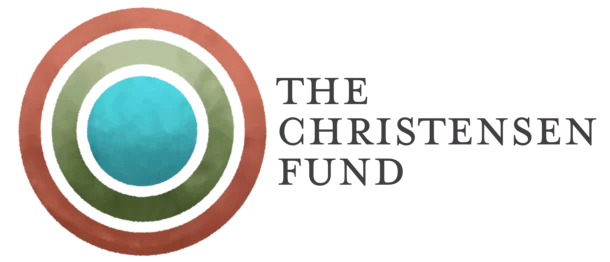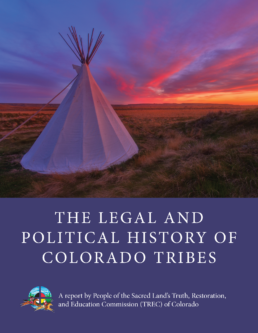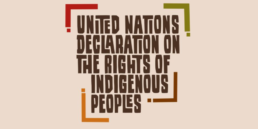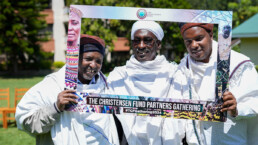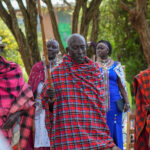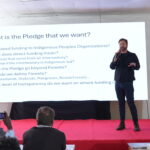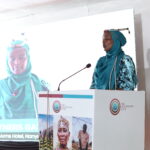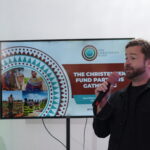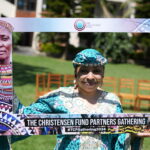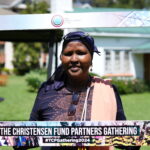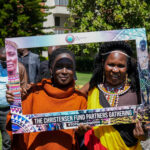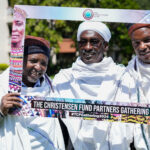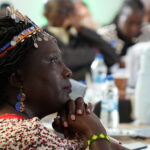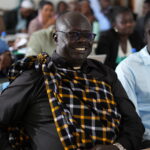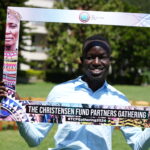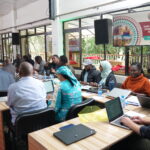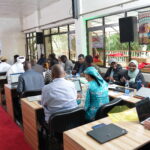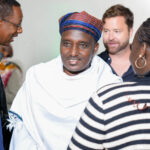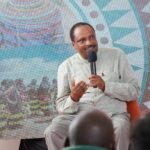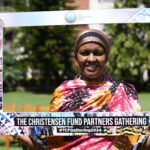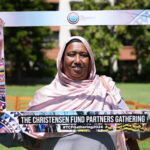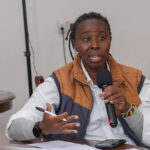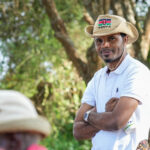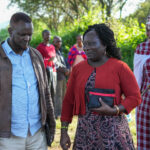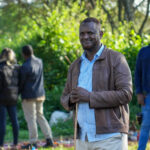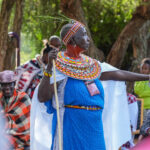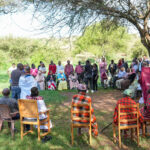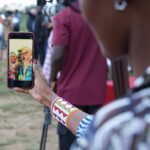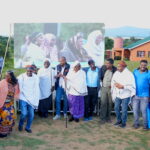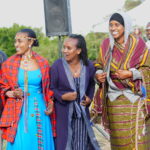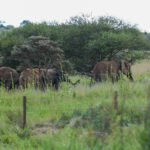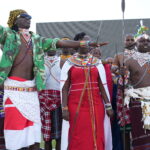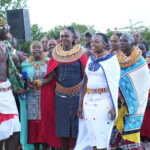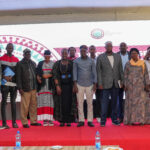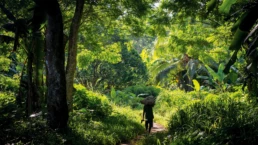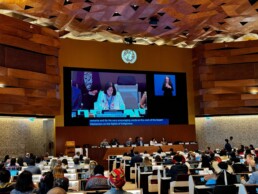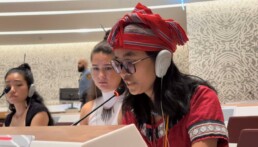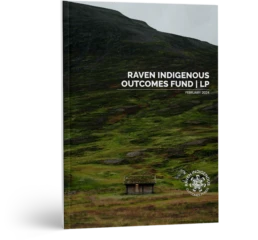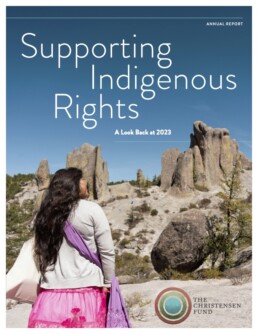December 2024 Newsletter
Dear colleagues,
As we experience the powerful moment of solstice, we carry a profound sense of reflection and urgency in this sacred time. We are, as always, inspired by our partners and their impactful work. We share below highlights from the last months.
Best wishes for the winter holidays, and thank you for your continued partnership.
Carla F. Fredericks
CEO
Recent Partner News
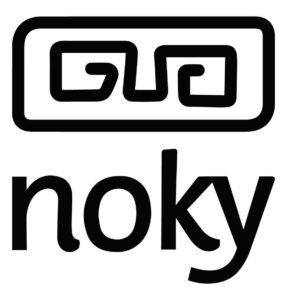 Colectivo Mixe has launched the first Indigenous-owned publishing house, NANOKY. This house will have editorial services and a printing press that will focus on the production of Mixe language books and other didactic materials for teaching and learning the Mixe language.ated the 17th anniversary of the General Assembly’s adoption of the United Nations Declaration on the Rights of Indigenous Peoples (UNDRIP). This milestone served as a crucial reminder about the importance of supporting Indigenous Peoples in their pursuit of self-determination. As we honor this important date, we continue to recognize that the ongoing implementation of UNDRIP is essential for fostering justice and equity. We commend our partners and relatives for their advocacy for the rights of Indigenous Peoples and communities worldwide.
Colectivo Mixe has launched the first Indigenous-owned publishing house, NANOKY. This house will have editorial services and a printing press that will focus on the production of Mixe language books and other didactic materials for teaching and learning the Mixe language.ated the 17th anniversary of the General Assembly’s adoption of the United Nations Declaration on the Rights of Indigenous Peoples (UNDRIP). This milestone served as a crucial reminder about the importance of supporting Indigenous Peoples in their pursuit of self-determination. As we honor this important date, we continue to recognize that the ongoing implementation of UNDRIP is essential for fostering justice and equity. We commend our partners and relatives for their advocacy for the rights of Indigenous Peoples and communities worldwide.
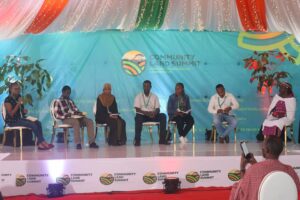 IMPACT Kenya, Namati, and Drylands Learning and Capacity Building Initiative gathered to discuss critical issues regarding protecting the rights of Indigenous Peoples in the African continent at the fourth Community Land Summit.
IMPACT Kenya, Namati, and Drylands Learning and Capacity Building Initiative gathered to discuss critical issues regarding protecting the rights of Indigenous Peoples in the African continent at the fourth Community Land Summit.
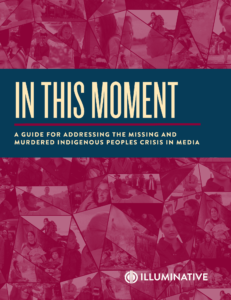 IllumiNative continues its groundbreaking work in building power for Native Peoples. They continue to build their resource library to enable others to join the movement to amplify a new narrative about Native peoples in the media, pop culture, K-12 education, and other critical sectors.
IllumiNative continues its groundbreaking work in building power for Native Peoples. They continue to build their resource library to enable others to join the movement to amplify a new narrative about Native peoples in the media, pop culture, K-12 education, and other critical sectors.
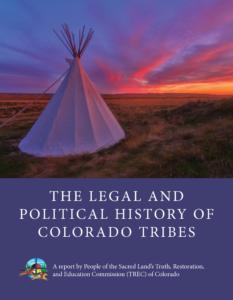 CBS has featured the People of the Sacred Land’s Truth, Reconciliation, and Education Commission and its impressive and critical work to restore justice and healing to native peoples.
CBS has featured the People of the Sacred Land’s Truth, Reconciliation, and Education Commission and its impressive and critical work to restore justice and healing to native peoples.
Re:Wild recently announced the return of Polynesian Storm-petrels, ground-nesting seabirds also known as White-throated Storm-petrels to Kamaka Island, French Polynesia, after 100+ years’ absence thanks to a successful restoration and rewilding project.
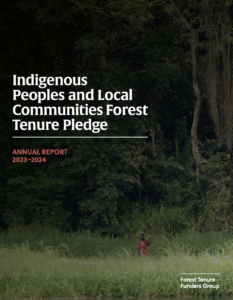
The Forest Tenure Funders Group Annual Report 2023-2024 describes our collective progress toward meeting the $1.7 billion COP26 Pledge, supporting land tenure and forest guardianship for Indigenous Peoples and Local Communities in tropical forest regions.

The Global Alliance of Territorial Communities, REPALEAC, Indigenous Peoples Rights International, International Work Group for Indigenous Affair, Sirge Coalition, International Indian Treaty Council, Cultural Survival, and many others attended the 29th Session of the Conference of the Parties to the United Nations Framework Convention on Climate Change, to strengthen and advocate for support of rights and direct financing to Indigenous Peoples.
October 2024 Newsletter
Anniversary of the United Nations Declaration on the Rights of Indigenous Peoples
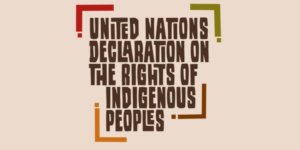 On September 13, we celebrated the 17th anniversary of the General Assembly’s adoption of the United Nations Declaration on the Rights of Indigenous Peoples (UNDRIP). This milestone served as a crucial reminder about the importance of supporting Indigenous Peoples in their pursuit of self-determination. As we honor this important date, we continue to recognize that the ongoing implementation of UNDRIP is essential for fostering justice and equity. We commend our partners and relatives for their advocacy for the rights of Indigenous Peoples and communities worldwide.
On September 13, we celebrated the 17th anniversary of the General Assembly’s adoption of the United Nations Declaration on the Rights of Indigenous Peoples (UNDRIP). This milestone served as a crucial reminder about the importance of supporting Indigenous Peoples in their pursuit of self-determination. As we honor this important date, we continue to recognize that the ongoing implementation of UNDRIP is essential for fostering justice and equity. We commend our partners and relatives for their advocacy for the rights of Indigenous Peoples and communities worldwide.
Video Series
Yasnaya Elena Aguilar Gil is a member of The Christensen Fund’s Indigenous Leaders Program. She is an Ayuuk Indigenous writer, linguist, translator, researcher, activist, and member of COLMIX Collective. In this video, she talks about the importance of linguistic diversity and the linguistic rights of Indigenous Peoples. This video is part of a series, The Christensen Fund, filmed at this year’s United Nations Permanent Forum on Indigenous Issues.
Climate Week September 22-29
We are excited about the opportunity that Climate Week presented for Indigenous Peoples to share their voices in the climate dialogue. This year’s theme, “It’s Time,” highlighted the urgency for collective action and innovation. The Christensen Fund co-sponsored several events focused on Indigenous-led climate solutions and encouraged awareness about the importance of direct funding for Indigenous-led efforts.
Numerous in-person and virtual events occurred throughout the week, providing a platform for Indigenous perspectives.
Recent Partner News
Pastoralist Peoples’ Initiative recently organized a cultural festival for the Rendille People, whose culture and languages are threatened by modernization. The event attracted a huge attendance, including local and national leaders.
The Christensen Fund congratulates CIELO on their tenth anniversary on October 2. They have done amazing work with Indigenous groups across Mexico. Join the celebration!
Sicangu Co welcomed Wak̇aŋyeja Ki Ṫokeyaḣc̄i (WKT) students back for the 2024-2025 school year! WKT is the only Lakota immersion school on the Rosebud Reservation, and this year, it has expanded to include a new kindergarten class, making it a K-4th grade school!
Forest Peoples Programme released a joint statement with Rainforest Foundation UK, Amnesty International, and Indigenous Peoples’ Law and Policy Programme (IPLP) welcoming the African Commission’s ruling that the government of the Democratic Republic of Congo (DRC) violated Batwa peoples’ rights when it forcibly evicted them from their ancestral land in the 1970s to create the Kahuzi Biega National Park. It is a significant victory for the Batwa people of the Democratic Republic of Congo and a step towards more inclusive conservation practices in the region.
The Christensen Fund Partners Gathering in Kenya
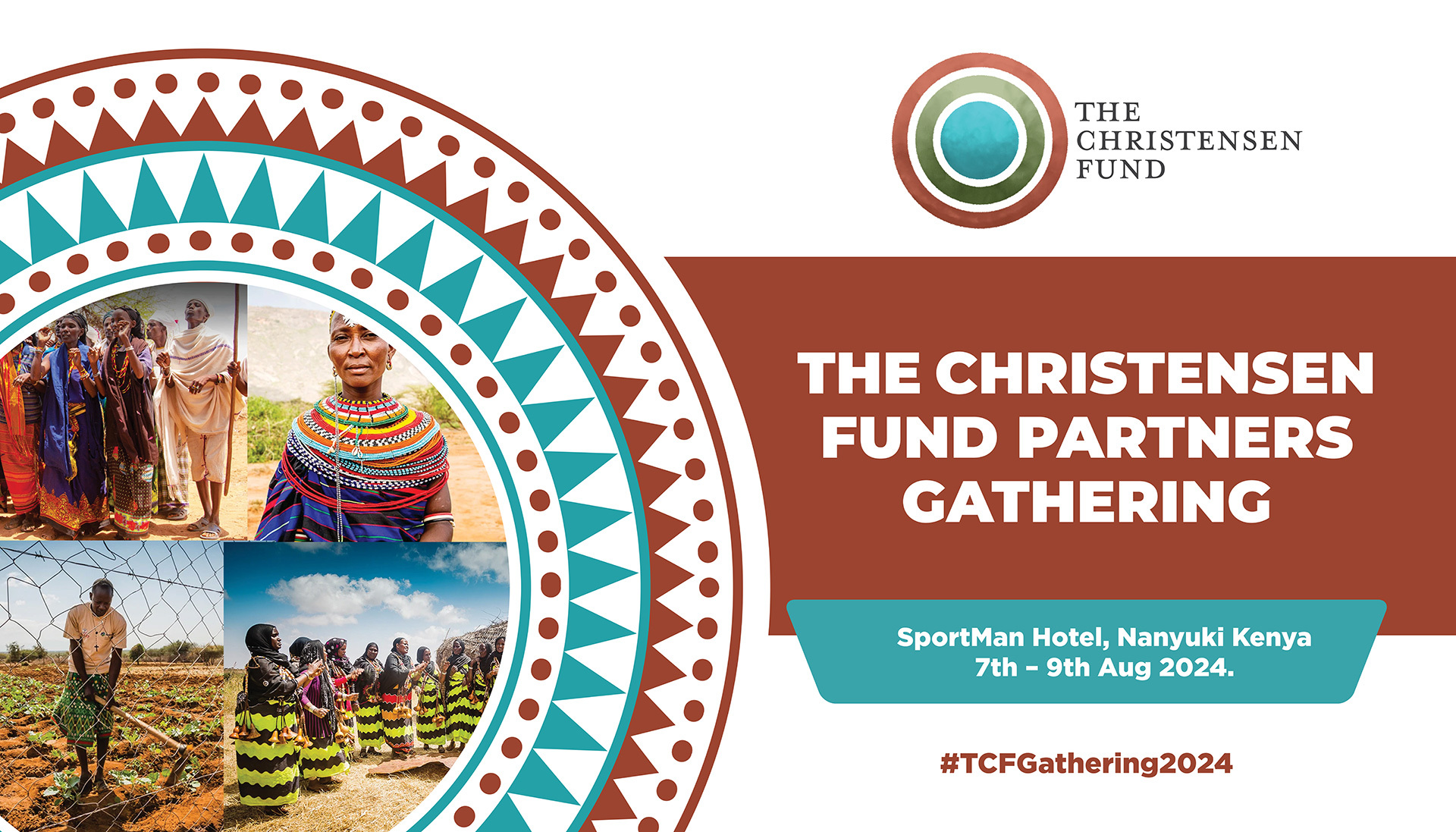
This month, the Christensen Fund organized a convening in Nanyuki, Kenya, bringing together thirty-two partner organizations from Kenya, Uganda, Tanzania, Cameroon, and Ethiopia. Self-determination, the right of Indigenous Peoples to freely determine their political status and pursue their economic, social, and cultural development, formed the central theme of the gathering. We recognize self-determination as a core right of Indigenous Peoples to maintain their traditional ways of life, protect their lands and resources, and participate fully in decisions affecting their futures.
The gathering focused on several critical themes intrinsically linked to self-determination: land rights and pastoral issues, wildlife conservation, carbon trading, green energy transition, and climate change. Partners explored these topics through the lens of how they impact Indigenous Peoples’ ability to exercise self-determination, highlighting both challenges and opportunities. Partners shared strategies, successes, and ongoing challenges in their efforts to empower Indigenous communities to control their own destinies.
Our gathering coincided with the International Day of the World’s Indigenous Peoples, allowing us to celebrate together in person at IMPACT Kenya, and further emphasized the global significance of Indigenous self-determination and the need for continued support and advocacy.
We understand that the right to self-determination requires ongoing support, resources, and collaboration. Our gathering sought to support the collective capacity of our incredible partners who work every day to advance Indigenous self-determination across Africa. We are humbled to see the ripple effect of empowerment across Indigenous communities in Africa, furthering the cause of self-determination and sustainable outcomes in our interconnected world.
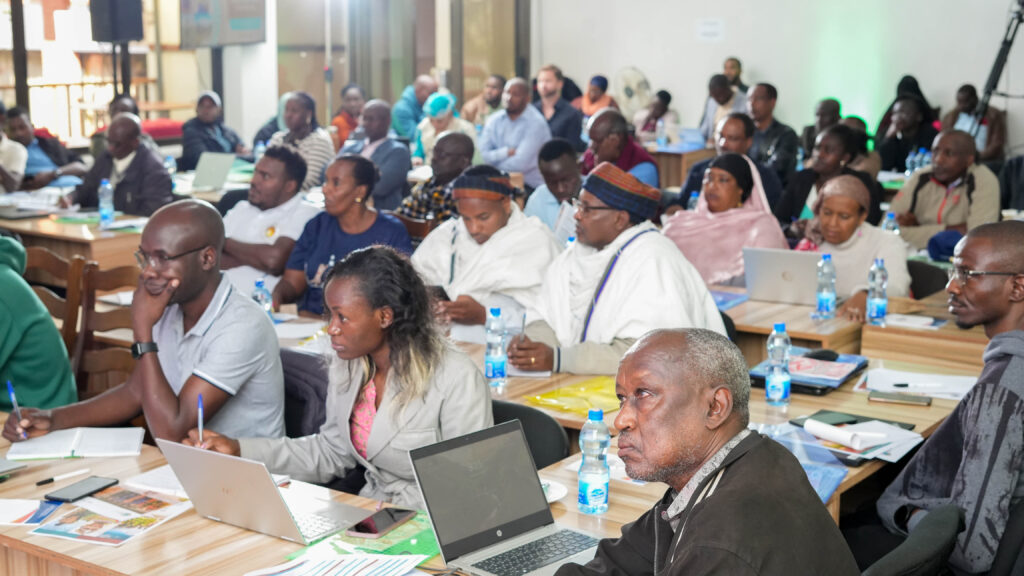
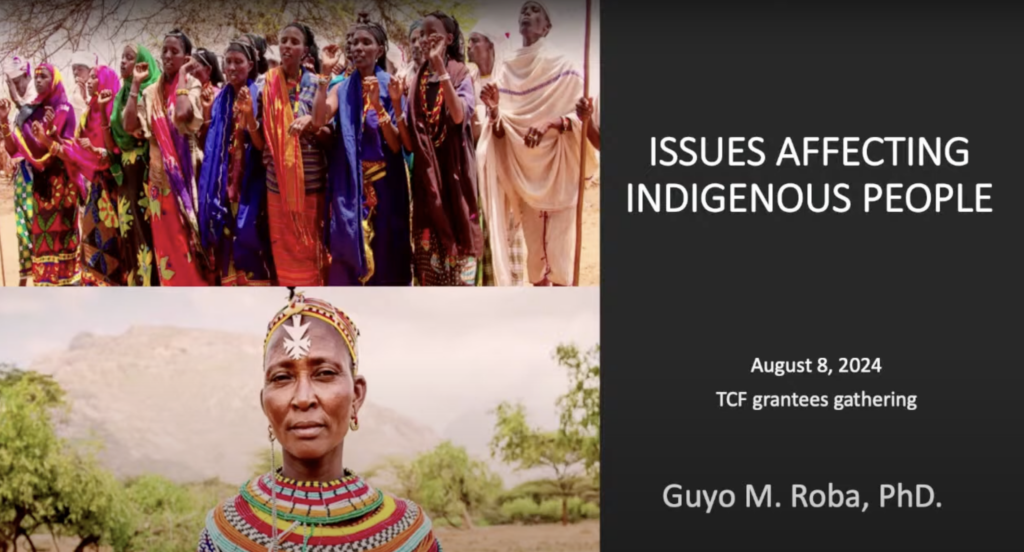
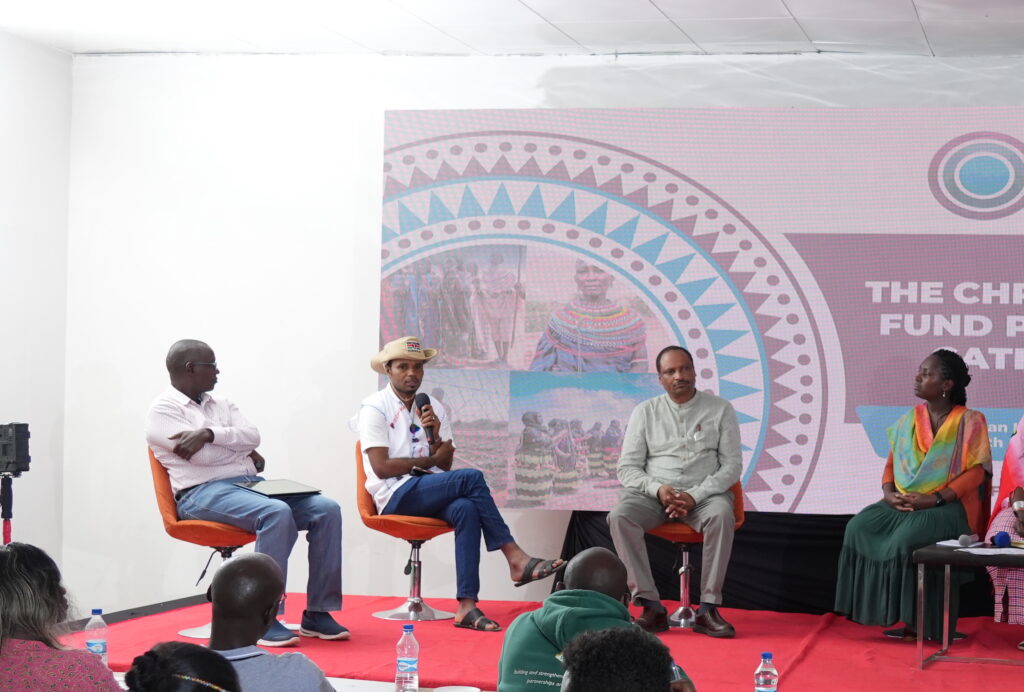 Above: Basiru Isu, Secretary General of the Network of Indigenous and Local Communities, Sustainable Management of Forest Ecosystems in Central Africa (REPALEAC) and Indigenous Leader with The Christensen Fund; Hussein Tadicha, Executive Director, Centre for Research and Development in Drylands (CRDD); Daniel Kobei, Founder and Executive Director, Ogiek Peoples’ Development Program (OPDP); Eileen Wakesho– Director, Community Land Protection, Namati.
Above: Basiru Isu, Secretary General of the Network of Indigenous and Local Communities, Sustainable Management of Forest Ecosystems in Central Africa (REPALEAC) and Indigenous Leader with The Christensen Fund; Hussein Tadicha, Executive Director, Centre for Research and Development in Drylands (CRDD); Daniel Kobei, Founder and Executive Director, Ogiek Peoples’ Development Program (OPDP); Eileen Wakesho– Director, Community Land Protection, Namati.
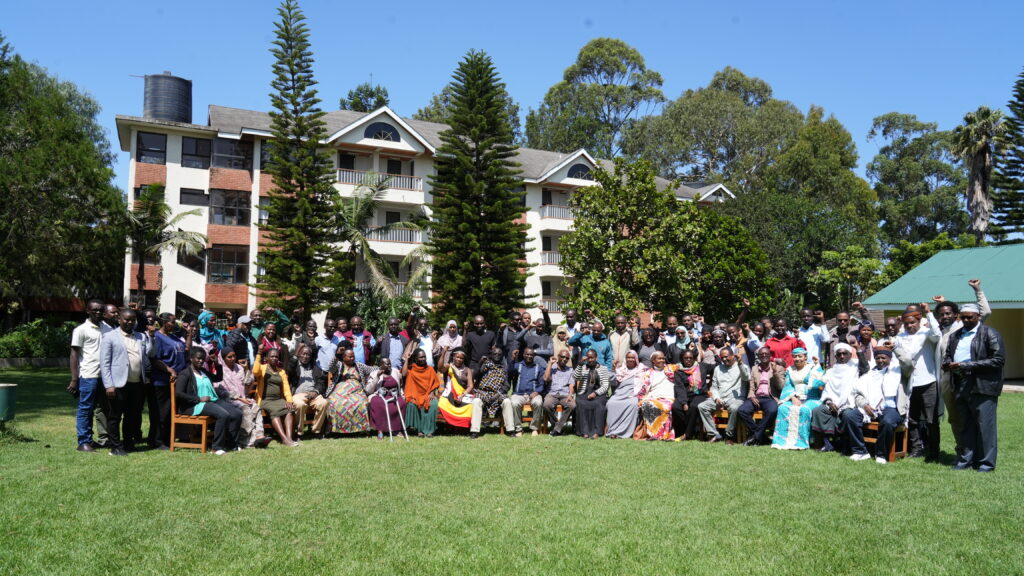
We are honored by the presence of our amazing partners. As Hassan Roba reflected, “Beyond addressing major obstacles affecting Indigenous Peoples’ self determination in Africa, the gathering has helped our partners to realize the power and opportunities of building solidarity towards a just cause. What remains are actions that would lead toward achieving these goals.”
The Christensen Fund Details Indigenous Peoples and Local Communities Pledge Commitments
Updated August 19, 2024
At the World Leaders Summit at COP26, the Christensen Fund joined the UK, Norway, Germany, the US, and the Netherlands, and over 15 private funders in a collective pledge of 1.7 billion USD for Indigenous and local communities to protect tropical forests that are vital ecosystems to address climate change, biodiversity loss, and pandemic risk. The Christensen Fund joined this pledge in recognition of the importance of the rights and self determination of Indigenous Peoples in climate finance commitments.
In carrying out our part of the pledge, The Christensen Fund is committed to:
1. Upholding the United Nations Declaration on the Rights of Indigenous Peoples (UNDRIP) in all of our actions,
2. Practicing transparency regarding our giving practices in carrying out our commitment to the wider pledge, and;
3. Being accountable by providing regular updates on our grantmaking, how we are engaging with other signatories, and how we are encouraging the participation of Indigenous peoples throughout the five years of the pledge.
To honor the self determination and the rights of Indigenous Peoples as affirmed by the UNDRIP, The Christensen Fund is providing direct support to organizations and community partners whose work and ways of life sustain and protect tropical forests. Below is a list of the organizations we have supported to date of which 76.62% are Indigenous-led organizations, and 89.78% of the grants offer unrestricted and flexible funding. 100% of the organizational support that The Christensen Fund provides is for the benefit of Indigenous Peoples. Grants (or portions thereof) that support this pledge made in 2024 as of August 19 total $3,842,500.00 to the following partner organizations:
- Aliansi Masyarakat Adat Nusantara
- Asia Indigenous Peoples Pact Foundation
- Asociación Civil de Trabajo Socioambiental de la Amazonía WATANIBA
- Charapa Consult
- Cultural Survival
- Dynamique des Groupes de Peuples Autochtones (DGPA)
- Environmental Defenders Collaborative
- Forest Peoples Programme
- Global Alliance of Territorial Communities
- If Not Us Then Who
- Indigenous Peoples Movement for Self-Determination and Liberation, Inc
- Indigenous Peoples Rights, Inc
- International Indian Treaty Council
- International Indigenous Women’s Forum
- International Land and Forest Tenure Facility
- International Work Group for Indigenous Affairs
- Mongabay Org Corporation
- Muuch-Kambal AC
- Ogiek Peoples’ Development Program
- Pawanka Fund
- Podáali – Fundo Indígena da Amazônia Brasileira
- Pueblo Originario Kichwa de Sarayaku
- Rainforest Foundation, Inc.
- Rainforest Foundation Norway
- Re:wild
- Rights and Resources Institute, Inc
- Tebtebba Foundation, Inc
- Ujamaa Community Resource Team
- Yayasan Anak Dusun Papua
Grants (or portions thereof) that support this pledge made in 2023 total $5,336,000 to the following partner organizations:
- Acuavita Foundation, for their fiscally sponsored project Comité para el Seguimiento a los 11 Planes de Justicia para Pueblos Indígenas
- Aliansi Masyarakat Adat Nustantra (AMAN)
- Awé Tibúame
- Carto-crítica
- Centro de Capacitacion y Defensa de los Derechos Humanos e Indigenas A.C.
- Centro de Derechos Humanos de la Montaña Tlachinollan, A.C.
- Centro Mexicano de Derecho Ambiental, A.C.
- Cordillera Peoples Alliance, Inc.
- El Quinto Elemento Laboratorio de Investigación e Innovación Periodística
- Environmental Law Alliance Worldwide
- Estudios Rurales y Asesoría AC
- Federación Indígena Empresarial y Comunidades Locales de México A. C. (CIELO)
- Fondo Defensores A.C.
- Fondo Defensores for their fiscally sponsored project Indigenous Rights Law Clinic
- Forest Peoples Programme
- Foro Para el Desarrollo Sustentable A.C.
- Fundacion Pro Defensa de la Naturaleza y sus Derechos, for their fiscally sponored project Accion Ecologica
- Fundación Tosepan A.C.
- Indigenous Movement for Peace Advancement and Conflict Transformation (IMPACT)
- Indigenous Peoples Movement for Self-Determination and Liberation (IPMSDL)
- Indignación Promoción y Defensa de los Derechos Humanos AC
- Instituto Mexicano de Desarrollo Comunitario A.C.
- International Treaty Indian Council
- Kumoontun
- Litigio Estratégico Indígena
- Muuch-Kambal AC
- Namati
- Observatorio Latinoamericano de Derechos Colectivos y Conflictos Socioambientales
- Periodismo De Abajo
- Podaali – Fundo Indigena da Amazonia Brasileira
- Proyecto de Derechos Sociales Económicos y Culturales
- Raíchali Independiente A.C.
- Rainforest Foundation USA
- Re:wild
- Redes para la Diversidad y la Equidad A.C.
- Rhizomatica Communications
- Rights and Resources Institute, Inc
- Servicios Integrales Emuri A.C. (SINÉ)
- Snowchange Cooperative
- Somos Viento
- Synchronicity Earth USA
- Tarahumara’s Children Hospital for their fiscally sponsored project Centros Culturales de la Tarahumara
- Telecomunicaciones Indígenas Comunitarias AC
- Tequio Jurídico A.C.
- Timo Patla Intercultural
- Tsikini A.C.
- U Yix Lu’um
Grants (or portions thereof) that support this pledge made in 2022 total $5,495,000 to the following partner organizations:
- Articulação dos Povos e Organizações Indígenas do Nordeste, Minas Gerais e Espírito Santo (APOINME)
- Asociacion Civil de Trabajo Socioambiental de la Amazonia WATANIBA
- Centro de Derechos Humanos de la Montaña Tlachinollan, A.C.
- Cordillera Peoples Alliance, Inc.
- Cultural Survival
- Fondo Defensores
- Forest Peoples Programme
- Fundacion Karisma
- Fundación Tosepan A.C.
- Global Greengrants Fund
- Indigenous Movement for Peace Advancement and Conflict Transformation (IMPACT)
- Instituto Mexicano de Desarrollo Comunitario A.C. (IMDEC) for their fiscally sponsored project Fondo Defensores
- Indigenous Peoples Movement for Self-Determination and Liberation (IPMSDL)
- Indigenous Peoples Rights International and their US Public Charity Indigenous Peoples Rights, Inc.
- International Working Group on Indigenous Affairs
- Land is Life
- Ogiek Peoples Development Programme (OPDP)
- Rainforest Foundation USA
- Redes para la Diversidad y la Equidad A.C.
- Redes para la Diversidad y la Equidad A.C. for their fiscally sponsored project Chicharras
- Redes para la Diversidad y la Equidad A.C. for their fiscally sponsored project Ojo de Agua
- Servicios Integrales Emuri A.C. (SINÉ) for their fiscally sponsored project Futuros Indígenas
- Synchronicity Earth USA
- Tebtebba Foundation, Inc.
- Tsikini A.C.
- Yayasan Anak Dusun Papua
Grants (or portions thereof) that support this pledge made in 2021 total $2,869,400 to the following partner organizations:
- Centro Mexicano de Derecho Ambiental, A.C.
- Cultural Survival
- Federación Indígena Empresarial y Comunidades Locales de México A. C. (CIELO)
- Foro Para el Desarrollo Sustentable A.C.
- Indigenous Peoples Rights International and their US Public Charity Indigenous Peoples Rights, Inc.
- Instituto Mexicano de Desarrollo Comunitario A.C. (IMDEC)
- Instituto Mexicano de Desarrollo Comunitario A.C. (IMDEC) for their fiscally sponsored project Fondo Defensores
- International Land and Forest Tenure Facility
- International Working Group on Indigenous Affairs
- Land is Life
- Namati
- Redes para la Diversidad y la Equidad A.C.
- Redes para la Diversidad y la Equidad A.C. for their fiscally sponsored project Ojo de Agua
- Servicios Integrales Emuri A.C. (SINÉ)
- Servicios Integrales Emuri A.C. (SINÉ) for their fiscally sponsored project Futuros Indígenas
- Tebtebba Foundation, Inc.
- Tequio Jurídico A.C.
The Christensen Fund will update its activities under the pledge at least quarterly. We look forward to continued engagement to ensure best practices in this important work. Please do not hesitate to contact us with any questions at info@christensenfund.org.
August 2024 Newsletter
The 17th Session of the Expert Mechanism on the Rights of Indigenous Peoples
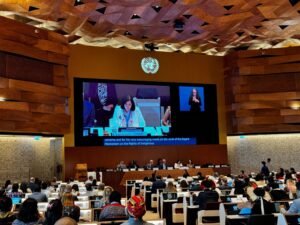
The Expert Mechanism on the Rights of Indigenous Peoples provides expert advice and studies to the United Nations Human Rights Council to ensure the rights of Indigenous Peoples are respected on a global scale. EMRIP was established by the Human Rights Council in 2007. EMRIP meets annually in furtherance of its role to conduct studies to advance the promotion and protection of Indigenous Peoples’ rights by clarifying the implications of key principles, such as self-determination and free, prior and informed consent; examine good practices and challenges in a broad array of areas pertaining to Indigenous Peoples’ rights; and suggest measures that States and others can adopt at the level of laws, policies and programmes.
At this year’s session, the Asia Indigenous Peoples Pact (AIPP) and the International Work Group for Indigenous Affairs (IWGIA) organized a panel discussion. The panel aimed to highlight the current status of implementing the Declaration of the Rights of Indigenous Peoples in Asia and emphasize its significance, given that Asia is home to more Indigenous Peoples than all other regions of the world combined.
Indigenous Peoples Rights International (IPRI) organized multiple side events and panel discussions during the session. These included a dialogue on the rights of Indigenous Peoples in post-conflict situations and their involvement in peace negotiations, agreements, and accords.
The UN Special Rapporteur on the Rights of Indigenous Peoples and the (EMRIP) work together to promote and protect Indigenous Peoples’ rights globally. While the Special Rapporteur focuses on country-specific situations and thematic studies, EMRIP provides expertise and advice to the UN Human Rights Council on Indigenous issues. Both mechanisms often coordinate their efforts to address pressing concerns affecting Indigenous communities worldwide.
Francisco Calí Tzay, the current UN Special Rapporteur on the Rights of Indigenous Peoples, has called for a moratorium on all carbon trading until the markets can guarantee that all actors will respect the rights of Indigenous Peoples. This statement exemplifies the kind of advocacy work undertaken by the Special Rapporteur in collaboration with EMRIP. For more comprehensive information on the UN Special Rapporteur’s work and recent developments, please refer to the latest issue of The Indigenous World, published by the IWGIA.
The International Indian Treaty Council (IITC) held consultations on a set of principles being developed by the United Nations Environment Programme (UNEP), designed to guide private conservation actors to uphold human rights within conservation funding activities. IITC’s work to gather feedback from Indigenous Peoples worldwide is a crucial effort to ensure the rights of Indigenous Peoples are respected in the creation of global conservation standards.
At the 17th Session of EMRIP and always, we commend our partners and their allies for the tireless and important work they do every day to advance the rights of Indigenous Peoples.
New! Video Series
In the coming months, we will share a series of videos highlighting perspectives of our leaders and our partners. Our first video features our Partner-Trustee, Ikal Angelei. Ms. Angelei is a prominent environmental advocate from Kenya, and is the co-founder and Director of Friends of Lake Turkana, a grassroots organization that seeks to foster social, economic and environmental justice in the Lake Turkana Basin. Ms. Angelei won the Goldman Environmental Prize for her advocacy on behalf of Indigenous communities in Northern Kenya. Watch here.
Robert T. Coulter, Executive Director of the Indian Law Resource Center, Retires
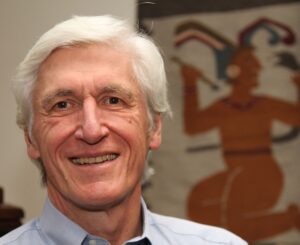
The Christensen Fund sends its most sincere congratulations to Robert T. Coulter upon his retirement as Executive Director at the Indian Law Resource Center (“ILRC”), an organization he founded and led for 46 years. Mr. Coulter steered ILRC through decades of landmark advocacy, litigation, and policy reform efforts. His legal acumen and unwavering commitment to justice have enabled ILRC to become a prominent voice in the fight for Indigenous rights, both within the United States and around the globe.
His work has also had a global impact, contributing to the recognition of Indigenous rights in international forums. His involvement in the drafting and promotion of the United Nations Declaration on the Rights of Indigenous Peoples (UNDRIP) is a testament to his dedication and influence. The Christensen Fund Trustee, Terri Henry, also a longtime Trustee of the ILRC, noted, “the adoption of UNDRIP marked a significant milestone in the global Indigenous rights movement, and UNDRIP would not have been possible without his tireless advocacy and brilliant mind.”
Mr. Coulter’s relentless pursuit of justice, strategic and compassionate approach, has inspired and empowered the fight for Indigenous rights. We are forever grateful for his legacy and work. We have supported ILRC since 2013, and are committed to continuing our strong support as it embarks on its next chapter of leadership.
Recent Partner News
Our partner, Tocabe Indigenous Marketplace, connects people to Indigenous ingredients and ready-made meals. They have just expanded their “Seed to Soul” philosophy–purchasing from Native producers to promote food sovereignty, strengthen local economies, and revitalize Indigenous cultures – to children’s meals with Little Harvest. Our kids have tested and they will tell you: the meals are delicious!
Our partner Tequio Jurídico supported the launch of the Chontal radio station–Jlijualay Tsomé 95.9––carrying the Chontal voices through the forests and villages of Oaxaca. Watch Tequio Jurídico’s Executive Director, Aracely Carbajal, talking about the Indigenous Chontal community-based radio station process.
The Water Channel featured the unique stories of our partner IMPACT Kenya’s RESTORE-RTF Project, showcasing the community impacts of direct financing for Indigenous Peoples in Africa.
If Not Us Then Who has launched Season 2 of their “Indigenous Impact Storytellers” podcast to celebrate the resilience and diverse narratives of Indigenous Peoples across the globe. Take a listen!
The 17th Session of the Expert Mechanism on the Rights of Indigenous Peoples
The Expert Mechanism on the Rights of Indigenous Peoples (EMRIP) provides expert advice and studies to the United Nations Human Rights Council to ensure the rights of Indigenous Peoples are respected on a global scale. EMRIP was established by the Human Rights Council in 2007. EMRIP meets annually in furtherance of its role to conduct studies to advance the promotion and protection of Indigenous Peoples’ rights by clarifying the implications of key principles, such as self-determination and free, prior and informed consent; examine good practices and challenges in a broad array of areas pertaining to Indigenous Peoples’ rights; and suggest measures that States and others can adopt at the level of laws, policies and programmes.
Our Partners at EMRIP

At this year's session, the Asia Indigenous Peoples Pact (AIPP) and the International Work Group for Indigenous Affairs (IWGIA) organized a panel discussion. The panel aimed to highlight the current status of implementing the Declaration of the Rights of Indigenous Peoples in Asia and emphasize its significance, given that Asia is home to more Indigenous Peoples than all other regions of the world combined.
Indigenous Peoples Rights International (IPRI) organized multiple side events and panel discussions during the session. These included a dialogue on the rights of Indigenous Peoples in post-conflict situations and their involvement in peace negotiations, agreements, and accords.
Read the statement presented by Rachana Sam on behalf of the Asia Indigenous Peoples Caucus.
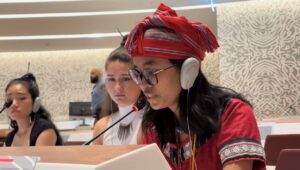
UN Special Rapporteur on the Rights of Indigenous Peoples
The UN Special Rapporteur on the Rights of Indigenous Peoples and the (EMRIP) work together to promote and protect Indigenous Peoples' rights globally. While the Special Rapporteur focuses on country-specific situations and thematic studies, EMRIP provides expertise and advice to the UN Human Rights Council on Indigenous issues. Both mechanisms often coordinate their efforts to address pressing concerns affecting Indigenous communities worldwide.
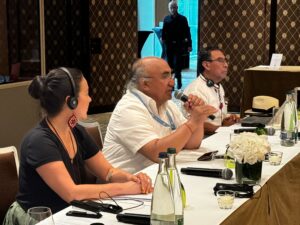
Francisco Calí Tzay, the current UN Special Rapporteur on the Rights of Indigenous Peoples, has called for a moratorium on all carbon trading until the markets can guarantee that all actors will respect the rights of Indigenous Peoples. This statement exemplifies the kind of advocacy work undertaken by the Special Rapporteur in collaboration with EMRIP. For more comprehensive information on the UN Special Rapporteur's work and recent developments, please refer to the latest issue of The Indigenous World, published by the IWGIA.
The International Indian Treaty Council (IITC) held consultations on a set of principles being developed by the United Nations Environment Programme (UNEP), designed to guide private conservation actors to uphold human rights within conservation funding activities. IITC's work to gather feedback from Indigenous Peoples worldwide is a crucial effort to ensure the rights of Indigenous Peoples are respected in the creation of global conservation standards.
At the 17th Session of EMRIP and always, we commend our partners and their allies for the tireless and important work they do every day to advance the rights of Indigenous Peoples.
July 2024 Newsletter
The Christensen Fund Attends the United Nations Permanent Forum on Indigenous Issues
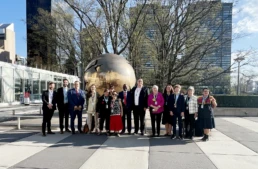
This April, The Christensen Fund’s entire board and staff came together with our partners to participate in the United Nations Permanent Forum on Indigenous Issues. Our Board made the decision to gather everyone together with our partners during this year’s Permanent Forum to manifest our deeply held commitments and values to stand in solidarity with our partners in our shared work. We were also fortunate to harness this unique opportunity to listen, learn, and deepen our connectivity to the organizations and communities we serve.
Program Related Investment: Raven Indigenous Outcomes Fund
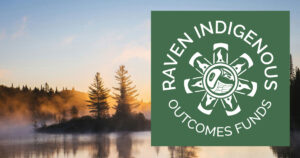 As part of The Christensen Fund’s pledge to provide catalytic capital for projects that can have a transformative impact for Indigenous communities, we have committed $2 million over a seven year term to support the Raven Indigenous Outcomes Fund (RIOF.) The RIOF is founded by and for Indigenous communities. It is a groundbreaking Indigenous-led fund of $50M CAD ($37.5M USD) dedicated to Indigenous outcomes-based financing deals, otherwise known as “pay for performance” projects.
As part of The Christensen Fund’s pledge to provide catalytic capital for projects that can have a transformative impact for Indigenous communities, we have committed $2 million over a seven year term to support the Raven Indigenous Outcomes Fund (RIOF.) The RIOF is founded by and for Indigenous communities. It is a groundbreaking Indigenous-led fund of $50M CAD ($37.5M USD) dedicated to Indigenous outcomes-based financing deals, otherwise known as “pay for performance” projects.
2023 Annual Report
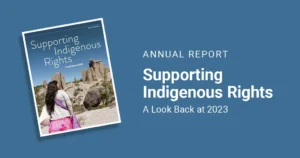 We are excited to share our 2023 annual report. As always, our values are rooted in the United Nations Declaration on the Rights of Indigenous Peoples (UNDRIP). To support the self-determination of Indigenous Peoples, we prioritize Indigenous-led organizations, including Indigenous-led funds. We invite you to dive into our 2023 year in review here.
We are excited to share our 2023 annual report. As always, our values are rooted in the United Nations Declaration on the Rights of Indigenous Peoples (UNDRIP). To support the self-determination of Indigenous Peoples, we prioritize Indigenous-led organizations, including Indigenous-led funds. We invite you to dive into our 2023 year in review here.
Indigenous Leaders Cohort
We are honored to introduce and welcome our 2024-2025 Indigenous Leaders Program Participants. The program celebrates four Indigenous leaders from Mexico, Cameroon, Indonesia, and the United States who are advancing the inherent rights, dignity, and self-determination of their communities, Nations, and Peoples while working to achieve the promise of the United Nations Declaration on the Rights of Indigenous Peoples (UNDRIP).
The Leaders Program was developed collaboratively with these Indigenous leaders in order to respect their prior commitments and demands on their time. In the spirit of self determination, these leaders will focus on issues or projects that they determine themselves. The program also holds space for these leaders to collaborate, learn from each other, and share reflections on the issues most important to them while enjoying the full support of each of their knowledge and experiences.
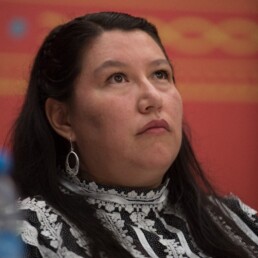
Yásnaya Elena Aguilar Gil (Mexico)
Yasnaya is an Ayuuk Indigenous writer, linguist, translator, researcher, and activist. Her work focuses on the promotion and study of the linguistic diversity and the endangered Indigenous languages in México. She is part of the COLMIX Collective, devoted to the research and promotion of the Indigenous Mixe Culture.
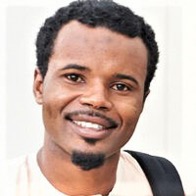
Basiru Isu (Cameroon)
Mr. Basiru is an energetic leader from Cameroon. He is currently the Secretary General of the Network of Indigenous and Local Communities for the Sustainable Management of Forest Ecosystems in Central Africa (REPALEAC), which coordinates the work of Indigenous Peoples across 8 countries in the Congo Basin.
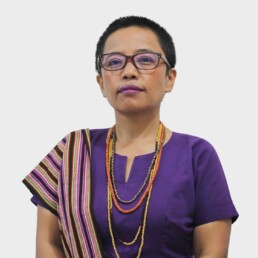
Rukka Sombolinggi (Indonesia)
Rukka Sombolinggi is in her second term as secretary-general of the Indigenous Peoples’ Alliance of the Archipelago (AMAN). She was born and raised in Toraja, South Sulawesi, Indonesia, and belongs to the Indigenous Toraja, who inhabit the highlands of South Sulawesi.
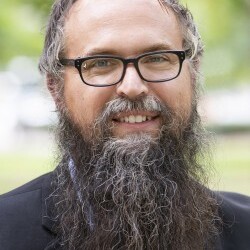
Kyle Whyte (United States)
Kyle Whyte is a faculty member teaching environmental justice at the University of Michigan, where he is George Willis Pack Professor, University Diversity and Social Transformation Professor, and Professor of Philosophy and Native American Studies. His research focuses on Indigenous climate policy, planning, and justice, and the ethics of cooperative relationships between Indigenous Peoples and science organizations.
Recent Partner News
IllumiNative expands its leadership team and launches Media Company – Announcement
Tocabe has started a new YouTube series to highlight Native food producers and their communities. Watch the first episode here
IMDEC launched its Learning Communities for an Emancipatory Practice training space 2024 – Info
Ujamaa Community Resource Team (UCRT) named a winner of the 2024 Ashden Award for their work in Natural Climate Solutions – Announcement
Tenure Facility announces partnership with Turning Tides – From the Forest to the Sea: Uniting for Tenure Rights
The Christensen Fund Announces Second Cohort of Indigenous Leaders Program
In 2022, The Christensen Fund launched its Indigenous Leaders Program, a cohort of leaders from Indigenous communities across the globe. This 2-year program supported four amazing leaders from Mexico, Kenya, the Philippines, and the United States. The Christensen Fund provided financial support for these leaders to connect with each other, our staff, and our board, to attend various meetings and retreats throughout their participation in the program from 2022 through 2023. We deeply appreciate each of their contributions to supporting Indigenous Peoples everywhere.
We are now honored to introduce and welcome our 2024-2025 Indigenous Leaders Program Participants. The program celebrates four Indigenous leaders from Mexico, Cameroun, Indonesia, and the United States who are advancing the inherent rights, dignity, and self-determination of their communities, Nations, and Peoples while working to achieve the promise of the United Nations Declaration on the Rights of Indigenous Peoples (UNDRIP).
The Leaders Program was developed collaboratively with these Indigenous leaders in order to respect their prior commitments and demands on their time. In the spirit of self determination, these leaders will focus on issues or projects that they determine themselves. The program also holds space for these leaders to collaborate, learn from each other, and share reflections on the issues most important to them while enjoying the full support of each of their knowledge and experiences.
Yásnaya Aguilar (Mexico)
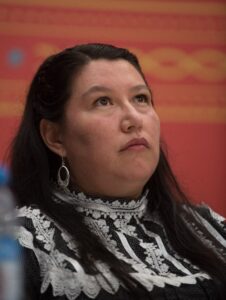 Yasnaya is an Ayuuk Indigenous writer, linguist, translator, researcher, and activist. Her work focuses on the promotion and study of the linguistic diversity and the endangered Indigenous languages in México. She is part of the COLMIX Collective, devoted to the research and promotion of the Indigenous Mixe Culture and collaborates with the Research Library Juan Córdoba, a specialized library on Indigenous cultures. In addition, she is actively involved in her community's system of self-government and the defense of her communities' natural resources and water, as well as defending the rights of Indigenous Peoples and the defense of the Ayuuk Indigenous territory. In 2020, she received the “National Prize for Equality and Non-discrimination”. She has given lectures, conferences, and workshops in different institutions in the country and abroad. As editor, she was one of the coordinators of the Tzam Project, a virtual space where Indigenous women from different nations write about various rights related issues. She is the author of several books, including Un nosotrxs sin estado, Ää.Manifiestos por la diversidad lingüística, La Sangre, la lengua y el apellido, and the anthology Tëkëëk Piky. Her writings have been translated into French, English and Portuguese.
Yasnaya is an Ayuuk Indigenous writer, linguist, translator, researcher, and activist. Her work focuses on the promotion and study of the linguistic diversity and the endangered Indigenous languages in México. She is part of the COLMIX Collective, devoted to the research and promotion of the Indigenous Mixe Culture and collaborates with the Research Library Juan Córdoba, a specialized library on Indigenous cultures. In addition, she is actively involved in her community's system of self-government and the defense of her communities' natural resources and water, as well as defending the rights of Indigenous Peoples and the defense of the Ayuuk Indigenous territory. In 2020, she received the “National Prize for Equality and Non-discrimination”. She has given lectures, conferences, and workshops in different institutions in the country and abroad. As editor, she was one of the coordinators of the Tzam Project, a virtual space where Indigenous women from different nations write about various rights related issues. She is the author of several books, including Un nosotrxs sin estado, Ää.Manifiestos por la diversidad lingüística, La Sangre, la lengua y el apellido, and the anthology Tëkëëk Piky. Her writings have been translated into French, English and Portuguese.
Basiru Isa (Cameroun)
 Mr. Basiru is an energetic leader from Cameroun. He is currently the Secretary General of the Network of Indigenous and Local Communities for the Sustainable Management of Forest Ecosystems in Central Africa (REPALEAC), which coordinates the work of Indigenous Peoples across 8 countries in the Congo Basin. For over a decade, Mr. Basiru has served Indigenous Peoples in Central Africa in supporting their aspiration towards an inclusive Indigenous People-led natural resources governance. He has been at the forefront of supporting the recognition of Indigenous Peoples in the region and in the protection of their rights as provided in UNDRIP. His experience and passion for serving Indigenous Peoples in central Africa is valuable in building collaboration and solidarity for Indigenous Peoples across Africa. The Christensen Fund Indigenous Leaders Program will enable Basiru to share his leadership experience and influence across Africa and promote collaboration with the network of global indigenous leaders.
Mr. Basiru is an energetic leader from Cameroun. He is currently the Secretary General of the Network of Indigenous and Local Communities for the Sustainable Management of Forest Ecosystems in Central Africa (REPALEAC), which coordinates the work of Indigenous Peoples across 8 countries in the Congo Basin. For over a decade, Mr. Basiru has served Indigenous Peoples in Central Africa in supporting their aspiration towards an inclusive Indigenous People-led natural resources governance. He has been at the forefront of supporting the recognition of Indigenous Peoples in the region and in the protection of their rights as provided in UNDRIP. His experience and passion for serving Indigenous Peoples in central Africa is valuable in building collaboration and solidarity for Indigenous Peoples across Africa. The Christensen Fund Indigenous Leaders Program will enable Basiru to share his leadership experience and influence across Africa and promote collaboration with the network of global indigenous leaders.
Rukka Sombolinggi (Indonesia)
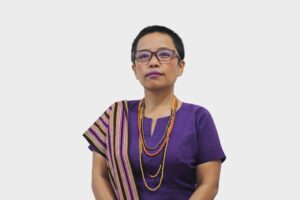 Rukka Sombolinggi is in her second term as secretary-general of the Indigenous Peoples’ Alliance of the Archipelago (AMAN). She was born and raised in Toraja, South Sulawesi, Indonesia, and belongs to the Indigenous Toraja, who inhabit the highlands of South Sulawesi. Prior to joining AMAN in 2000, Rukka was involved in the Indigenous Peoples’ movement through the Jaringan Pembelaan Hak-hak Masyarakat Adat (JAPHAMA) or Network for the Defense of Indigenous Peoples’ Rights, working group of Indigenous People and environmental activists that later gave birth to AMAN. In more than 20 years working at AMAN, Rukka has had various positions, including national advocacy staff, international advocacy coordinator, special staff to the secretary general, and deputy to the secretary-general for advocacy, legal, and political affairs. She also worked as a program specialist at the United Nations Development Program for the Regional Indigenous Peoples' Program in Bangkok, Thailand, in 2006-2010. Rukka holds a bachelor’s degree in agriculture from Hasanuddin University in Makassar, South Sulawesi, Indonesia, and a master’s degree in political science from Chulalongkorn University in Bangkok, Thailand.
Rukka Sombolinggi is in her second term as secretary-general of the Indigenous Peoples’ Alliance of the Archipelago (AMAN). She was born and raised in Toraja, South Sulawesi, Indonesia, and belongs to the Indigenous Toraja, who inhabit the highlands of South Sulawesi. Prior to joining AMAN in 2000, Rukka was involved in the Indigenous Peoples’ movement through the Jaringan Pembelaan Hak-hak Masyarakat Adat (JAPHAMA) or Network for the Defense of Indigenous Peoples’ Rights, working group of Indigenous People and environmental activists that later gave birth to AMAN. In more than 20 years working at AMAN, Rukka has had various positions, including national advocacy staff, international advocacy coordinator, special staff to the secretary general, and deputy to the secretary-general for advocacy, legal, and political affairs. She also worked as a program specialist at the United Nations Development Program for the Regional Indigenous Peoples' Program in Bangkok, Thailand, in 2006-2010. Rukka holds a bachelor’s degree in agriculture from Hasanuddin University in Makassar, South Sulawesi, Indonesia, and a master’s degree in political science from Chulalongkorn University in Bangkok, Thailand.
Kyle Whyte (United States)
 Kyle Whyte is a faculty member teaching environmental justice at the University of Michigan, where he is George Willis Pack Professor, University Diversity and Social Transformation Professor, and Professor of Philosophy and Native American Studies. He is founding Faculty Director of the Tishman Center for Social Justice and the Environment, Principal Investigator of the Energy Equity Project, and Senior Fellow in the Michigan Society of Fellows. His research focuses on Indigenous climate policy, planning, and justice, and the ethics of cooperative relationships between Indigenous Peoples and science organizations. He is an enrolled member of the Citizen Potawatomi Nation. Kyle is currently a U.S. Science Envoy for Indigenous and Local Knowledge, serves on the White House Environmental Justice Advisory Council, and is President of the Board of Directors of the Michigan Environmental Justice Coalition. Kyle has worked for two decades in advocacy of Indigenous climate justice. He collaborates within a network of diverse Indigenous Peoples and Indigenous-led educational institutions and organizations worldwide to advance self-determination in climate leadership, organizing, research, and education.
Kyle Whyte is a faculty member teaching environmental justice at the University of Michigan, where he is George Willis Pack Professor, University Diversity and Social Transformation Professor, and Professor of Philosophy and Native American Studies. He is founding Faculty Director of the Tishman Center for Social Justice and the Environment, Principal Investigator of the Energy Equity Project, and Senior Fellow in the Michigan Society of Fellows. His research focuses on Indigenous climate policy, planning, and justice, and the ethics of cooperative relationships between Indigenous Peoples and science organizations. He is an enrolled member of the Citizen Potawatomi Nation. Kyle is currently a U.S. Science Envoy for Indigenous and Local Knowledge, serves on the White House Environmental Justice Advisory Council, and is President of the Board of Directors of the Michigan Environmental Justice Coalition. Kyle has worked for two decades in advocacy of Indigenous climate justice. He collaborates within a network of diverse Indigenous Peoples and Indigenous-led educational institutions and organizations worldwide to advance self-determination in climate leadership, organizing, research, and education.
The Christensen Fund Announces Program Related Investment in Raven Indigenous Outcomes Fund
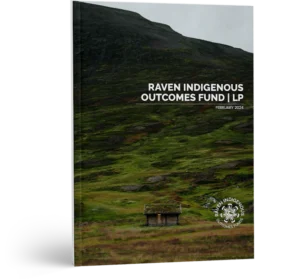 As part of The Christensen Fund’s pledge to provide catalytic capital for projects that can have a transformative impact for Indigenous communities, we have committed $2 million over a seven year term to support the Raven Indigenous Outcomes Fund (RIOF.) The RIOF is founded by and for Indigenous communities. It is a first of-its-kind Indigenous-led fund of $50M CAD ($37.5M USD) dedicated to Indigenous outcomes-based financing deals, otherwise known as pay-for-success projects or pay-for-performance projects.
As part of The Christensen Fund’s pledge to provide catalytic capital for projects that can have a transformative impact for Indigenous communities, we have committed $2 million over a seven year term to support the Raven Indigenous Outcomes Fund (RIOF.) The RIOF is founded by and for Indigenous communities. It is a first of-its-kind Indigenous-led fund of $50M CAD ($37.5M USD) dedicated to Indigenous outcomes-based financing deals, otherwise known as pay-for-success projects or pay-for-performance projects.
With their Indigenous Outcomes Fund, Raven has developed a strong pathway model for meeting their Community Development Outcome Contracts goals. This begins with Indigenous community-initiated calls for solutions, community leader engagement, demonstrated management capacity, and a process of defining the feasibility and clarity of a pathway to solutions.
At the heart of their approach to creating new and inclusive financing structures is The Solutions Lab. The Solutions Lab convenes Indigenous leaders such as elders, Chief, Council, and members of the target beneficiary demographic. The convening employs community learning to build trust-based relationships inclusive of Indigenous protocols and ceremony. Here, the participants co-design outcome measures and metrics with a focus on both governance and operational leadership as key to success and reducing leadership risk.
Raven’s work is innovative and impactful for First Nations and Indigenous Peoples globally. By harnessing their financial acumen and trust as well as engaging in deep collaboration with Indigenous Peoples, Raven has reduced the risk for investors seeking positive outcomes in communities considered too risky for investment of any type beyond grant funding. The return on investment is positive, the social and economic impacts are significant and align with The Christensen Fund’s core value of self-determined Indigenous outcomes.
IMPACT CHARITABLE
This exciting program related investment was set up with Impact Charitable, which exists to unite catalytic philanthropists, community partners, financial institutions, foundations, social enterprises, and governmental bodies. Impact Charitable helps close the gaps between the sources of impact-first capital and communities, ventures, and funds who have traditionally faced systemic barriers to accessing critical financial resources. This collaboration with Impact Charitable makes it easy for people to invest alongside us.
If you are interested in joining us in these investments, contact: cindy@impactcharitable.org or shawn@christensenfund.org
Follow us on Instagram, LinkedIn and Facebook for regular news and updates on our partners. And click here to read more about our Program Related Investments.
The Christensen Fund's 2023 Annual Report: Supporting Indigenous Rights
The Christensen Fund is excited to share our 2023 annual report with our colleagues around the world. More so than ever before, our values are rooted in the United Nations Declaration on the Rights of Indigenous Peoples (UNDRIP). To support the self-determination of Indigenous Peoples, we prioritize Indigenous-led organizations, including Indigenous-led funds.
In our practice of trust-based philanthropy, we almost always provide general operating support grants, maintain flexible requirements and criteria, and prioritize joint learning rather than stringent monitoring and evaluation. We strive to create connections between communities and movements at the grassroots, subnational, national and international levels.
Thanks to our Board, staff, philanthropic colleagues and partners around the globe for informing our strategy and helping us reflect on all the learning that occurred in 2023.

